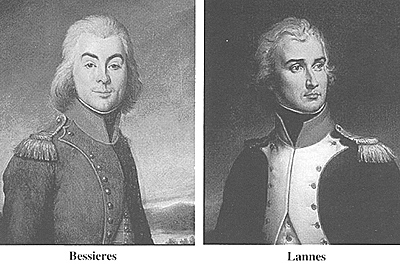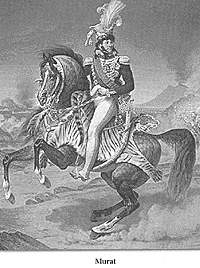Another Bitter Feud
The Relationship
Between Lannes and Bessieres
by Patrick E. Wilson, USA
| |
This feud dated back to the early days in
Italy when Lannes and the future Marechal
Joachim Murat competed for Napoleon's
favour. Lannes and Murat were also rivals
for the hand of Napoleon's sister Caroline.
Initially Napoleon was in favour of Lannes
but Murat through his friendship with
Bessieres, they both came from the same
area of France and had met before the
revolution, discredited Lannes in the eyes
of Napoleon. It was this issue that would
sour relations between Lannes and
Bessieres.
Jean Baptiste Bessieres started his
military career in the Army of the Pyrenees
in 1792 in the 22nd Chasseurs a Cheval
but before that he attended college at
Cahors where he had met a certain
Joachim Murat. Bessieres had, it seems,
enlisted in the 22nd Chasseurs as he fled
south from Paris having participated in the
defence of Tuileries and like another future
marechal, Dominique Catherine Perignon,
may have been on the way out of the
country when he enlisted. Both men were
strongly conservative, certainly not
revolutionaires, indeed Bessieres continued
to powder his hair in the old style
throughout his life.
In June
1796, at Murat's suggestion, the future
Emperor of France appointed Bessieres as
commander of his new Guides, a personal
bodyguard formed after a very close
encounter with the Austrian foe. Bessieres
went on to command these troops with his
usual conscientiousness and soon became
one of Napoleon's few real friends,
unfortunately another of these friends was
Jean Lannes.
Jean Lannes, a volatile gascon, like
Bessieres began his career in the Army of
the Eastern Pyrenees. Where, fighting with
great bravery and tenacity he established
himself as an infantry commander of the
first rank and when transferred to Italy in
1795 he was a Colonel with a redoubtable
reputation. By April 1796 he was leading
an elite force of grenadier and carabineer
battalions, playing a leading part at both
the Battles of Lodi and Bassano he was
soon promoted General of Brigade. But it
was at Arcola that he really made his mark
and began his friendship with Napoleon
Bonaparte, when he rescued the general
when he had become unhorsed in the
fighting at the bridge at Arcola. There after
Lannes and Bonaparte became firm
friends, after he became Emperor
Napoleon let only Lannes speak to him
with a familiarity that astonished others.
From Italy Lannes followed Napoleon
to Egypt where he fought with his usual
devotion but also clashed with Joachim
Murat. Murat accusing him of relaying his
comments about the conduct of the
campaign to Napoleon (Murat had openly
criticised Napoleon's plans). This episode
soured relations between the two men and
led to a rivalry that existed until Lannes
death, the fact that both were wounded at
the Battle of Aboukir and had to lie side
by side in hospital did not adhere either to
one another. Indeed, on the return from
Egypt after Napoleon's successful coup
Lannes found himself appointed
commandant and inspector of the Consular
Guard over Murat, which hardly adhered
him to Murat. Though Murat was to gain
that which Lannes coveted most, the hand
of Caroline Bonaparte. It seems that
Caroline was attracted far more by the
handsome cavalier then the frequently
wounded infantryman, despite Napoleon's
wish that it was Lannes she married.
Though it is possible that Caroline may
have married Murat to get at Napoleon and
establish her own independence, anyhow
the marriage turned out to be a surprisingly
successful one, Murat being a loving
husband and father. Lannes though was not
happy, even less so when he knew that the
commander of the cavalry of the Consular
Guard was none other then Jean Baptiste
Bessieres, a friend and confidant of Murat.
It was inevitable that Lannes and Bessieres
would come into conflict, especially as
Lannes saw Bessieres as something of a
toady, a creature of Murat.
The episode, which lit the touch paper
so to speak, occurred during the Battle of
Marengo, when the French were literally
fighting for their lives. General Lannes
having held on for most of the Morning at
Marengo was then falling back with his
troops and requested, or rather demanded
that Bessieres, who had just came up with
the cavalry of the Consular Guard, to
charge the enemy threatening his right
flank. Bessieres, who had just seen the
infantry of the Consular Guard hacked to
pieces by Austrian cavalry and could see
Austrian infantry ready to receive him,
followed the example of the 72nd Ligne
infantry and declined to attack, preferring
to preserve his squadrons for later in the
day, when they charged in support of
General Desaix's successful counter-attack.
It is also probable that Napoleon wanted to
preserve his Consular Guard cavalry. But
be that as it may, after the battle Lannes
accused Bessieres of failing to provide
adequate support. This of course did not go
down too well with Bessieres, a man
known for his conscientiousness and
integrity, and consequently when he had
the opportunity he supplied the information
he knew Murat would use to discredit
Lannes. That information concerned the
finances of the Consular Guard for which
Lannes was responsible. After the Battle of
Marengo Lannes had endeavoured to make
the Consular Guard look the part,
equipping them in the most gorgeous
uniforms and in the process overdrew his
account with the military authorities by
some three hundred thousand francs.
Lannes actually did this to please
Napoleon with the appearance of the
Consular Guard. However Napoleon on
being told by Murat not only berated
Lannes but told him to repay the amount
immediately or face court martial within
the week. Murat, and perhaps Bessieres
too, of course was elated and poor Lannes
would have been finished if General Pierre
Augereau, a good friend from the Italian
campaign had not lent him the money.
Napoleon though still dismissed Lannes
from his position and sent him to Portugal
as ambassador, where he spent the next
five years. This did not prevent him from
receiving a Marechal's baton nor from
becoming a relatively rich man through his
good relations with the Portuguese Prince
Regent John. So it may be that Bessieres
actions benefited Lannes career, definitely
the financial aspect of his life, for the
better in the long. It did indeed keep him
from coming to blows with Bessieres and
Murat.
Next Clash
The next clash between Lannes and
Bessieres did not occur until 1807,
although Lannes certainly clashed with
Murat during the Ulm phase of the 1805
campaign, for which he earned the support
of Marechal Michel Ney, who did not like
Murat either. Indeed, Ney only just resisted
the temptation to run Murat through after
he insulted him in an interview. The event
that led to further enmity between
Bessieres and Lannes was the meeting of
the two Emperors, Napoleon and
Alexander, when they met on a raft in the
middle of the Niemen River.
Each sovereign was to be accompanied by five
of his most illustrious generals, Lannes
was not included in the five Napoleon
choose but Bessieres (along with Berthier,
Duroc and Caulaincourt) was despite the
fact that Lannes had far more distinguished
himself in the 1807 campaign then had
Bessieres. To some extent Lannes was to
be mollified by his appointment as Duc de
Montebello, after a victory he had won the
day before the Battle of Marengo but he
still harboured a grudge against Bessieres
whom he considered to be incompetent.
The final confrontation was to occur
in May 1809 at the Battle of Aspern-Essling when Bessieres found himself
placed under the orders of Lannes. Seeing
Bessieres' Cavalry Reserve inactive Lannes
sent Bessieres an order to charge home, it
was an order that clearly implied that
Bessieres was not doing his duty. But the
first two aides-de-camp must have
modified the message, as it was clearly not
having the intended effect. Summoning
another aide-de-camp, de Marbot, Lannes
give him the order to repeat and
emphasised the words to be used. You
understand Sir, Charge home!
Marbot himself fully appreciated the implication of
the order, he later wrote: "I perfectly
understood that Lannes wished to mortify
Bessieres, first by taking a harsh way of
reminding him that the Emperor had put
him in a subordinate post to himself, and
further by finding fault with his
management of the cavalry. I was
perturbed at being obliged to transmit such
offensive expressions to the other
Marechal. It was easy to foresee that they
might have awkward results; but my
immediate chief must be obeyed". [1]
Marbot consequently repeated the
order verbatim, Bessiere was not happy
and nearly had Marbot punished on the
spot but he obeyed the order and pushed
back the Austrian advance as Lannes had
foreseen. He was greatly pleased and
remarked to Marbot: "You see that my
stern injunction has produced an excellent
effect; but for it Monsieur Le Marechal
Bessieres would have fiddled about all
day." [2]
At this Lannes himself stepped forward
and spoke to Bessieres, first defending
Marbot's actions and then replying to
Bessieres' accusation that to order him to
charge home was unseemly.
Lannes replying that; "They are quite right Sir,
and it was I who dictated them; did not the
Emperor tell you that you were under my
orders?" [4]
To this Bessieres replied that
the Emperor had warned him he must
comply with Lannes opinion. "Know Sir,"
replied Lannes, "that in military matters
people do not comply, they obey! If the
Emperor had thought fit to place me under
your command, I should have offered him
my resignation; but so long as you are
under mine, I shall give you orders and
you shall obey them; otherwise I shall
withdraw the command of the troops from
you. As for charging home, I give you the
order because you did not do it and
because all the morning you were
parading before the enemy without
approaching him boldly." [5]
At this Bessieres demanded satisfaction and since
Lannes was more than happy to oblige,
blows would have been exchanged if at
moment Marechal Massena had not
intervened. "I am your senior, gentlemen,
you are in my camp, and I shall not permit
you to give my men the scandalous
spectacle of seeing two Marechals draw on
each other; and that in the presence of the
enemy. I summon you therefore, in the
name of the Emperor, to separate at
once." [6]
Massena then lead Lannes away
and thus ended the last confrontation
between Lannes and Bessieres, the issue
was to be settled the following day for
good when Lannes received what turned
out to be a mortal wound. Still if Massena
had not been present either Bessieres or
Lannes would have killed the other in a
scandalous duel that would probably have
seen the survivor disgraced. It is also clear
that this was yet another example of the
feud's within the Marechalate of
Napoleon's Empire, which, if it allowed
Napoleon to retain his power because his
rivals were too much at each other's
throats, also at times undermined the
Empire itself when the Marechals failed to
support their colleagues adequately. The
Peninsular War contains a number of
examples of this and the Battle of
Dennewitz in 1813 is a prime example,
when Marechal Oudinot failed to provide
Marechal Ney with the support he
deserved as a fellow officer. Anyone who
has read an account of this battle will
know what I mean.
Finally did Lannes and Bessieres
conduct a bitter feud between themselves?
Almost certainly so, especially given
Lannes' character, though I suspect that
they may have been manipulated by Murat
to some degree. The irony is that they were
both firm friends of Napoleon and would
both die in his service.
Atteridge, A.H., Marshal Murat, King of Naples (East Sussex: The Naval & Military Press, 2001 reprint)
|
 In an earlier essay I wrote about the
bitter feud that had existed between Marechals Ney and Soult. In this
essay I shall write about another feud, one just as severe, as Marechals Jean Lannes
and Jean Baptiste Bessieres, two of Napoleon's closest friends, conducted a
lively feud until Lannes' death in 1809.
In an earlier essay I wrote about the
bitter feud that had existed between Marechals Ney and Soult. In this
essay I shall write about another feud, one just as severe, as Marechals Jean Lannes
and Jean Baptiste Bessieres, two of Napoleon's closest friends, conducted a
lively feud until Lannes' death in 1809.
 From November 1792 to August 1795
he served with distinction in the Army of
the Eastern Pyrenees and ended the
campaign as a Captain. Incidentally it was
also the army that General Perignon led to
final victory at Rosas in 1795. Peace was
then concluded and Bessieres' regiment
was then transferred to Italy, where chance
would have it that he met his old friend
from his college days at Cahors, Joachim
Murat, who was then Aide-de-Camp to
General Napoleon Bonaparte.
From November 1792 to August 1795
he served with distinction in the Army of
the Eastern Pyrenees and ended the
campaign as a Captain. Incidentally it was
also the army that General Perignon led to
final victory at Rosas in 1795. Peace was
then concluded and Bessieres' regiment
was then transferred to Italy, where chance
would have it that he met his old friend
from his college days at Cahors, Joachim
Murat, who was then Aide-de-Camp to
General Napoleon Bonaparte.  However, later that day whilst
walking towards Aspern in search of
Marechal Andre Massena, Lannes and
Marbot suddenly came upon Bessieres,
who immediately recognised Marbot,
though he did not see Lannes who was
slightly hidden by the darkness of the
evening. Advancing upon Marbot, he
greeted him thus; "Ah it is you, Sir! If
what you said to me earlier came from you
alone, I will teach you to choose your
words better when speaking to your
superiors; if you were only obeying your
Marechal then he shall give me
satisfaction; and I bid you tell him so." [3]
However, later that day whilst
walking towards Aspern in search of
Marechal Andre Massena, Lannes and
Marbot suddenly came upon Bessieres,
who immediately recognised Marbot,
though he did not see Lannes who was
slightly hidden by the darkness of the
evening. Advancing upon Marbot, he
greeted him thus; "Ah it is you, Sir! If
what you said to me earlier came from you
alone, I will teach you to choose your
words better when speaking to your
superiors; if you were only obeying your
Marechal then he shall give me
satisfaction; and I bid you tell him so." [3]